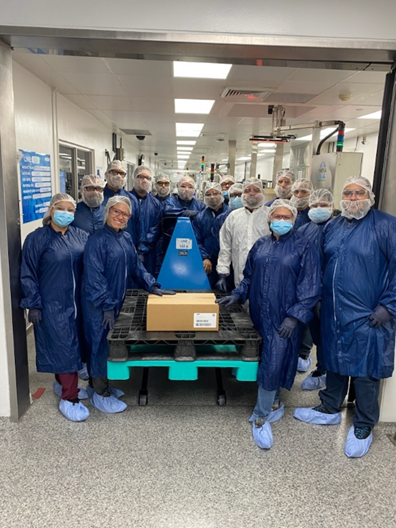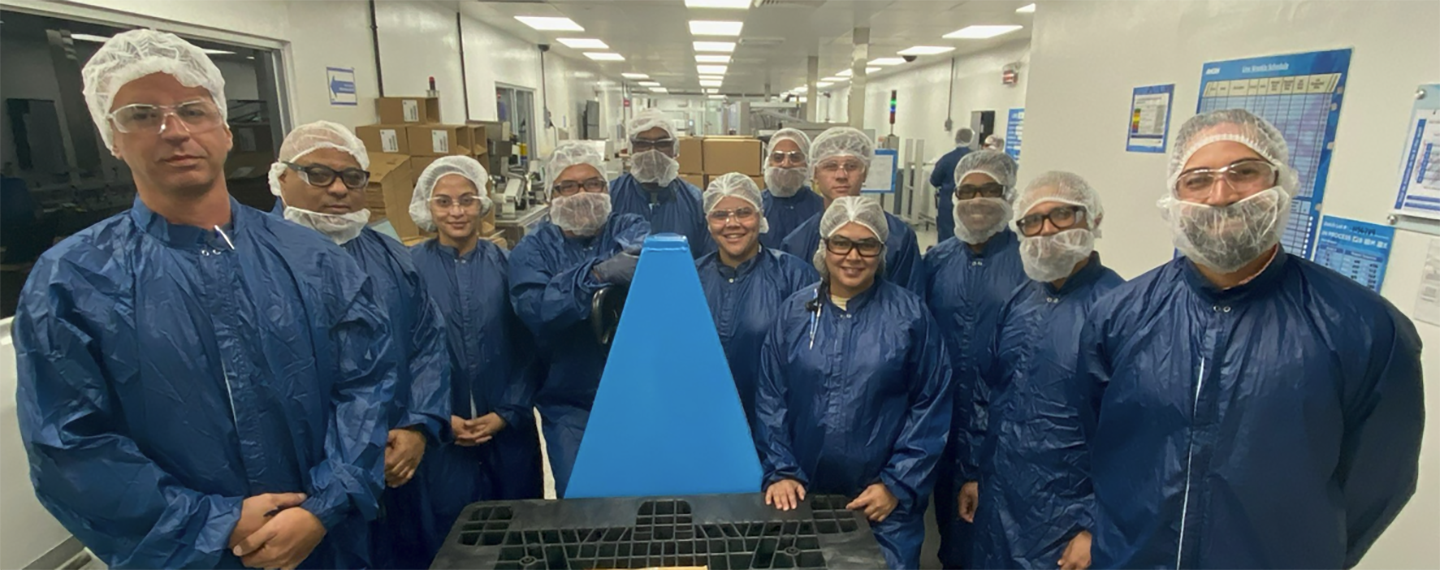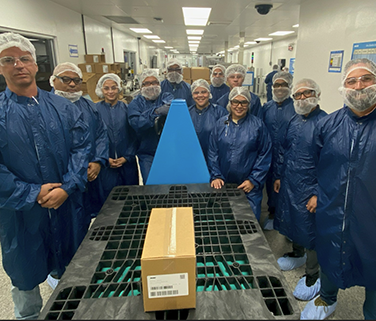As the U.S. biosimilars market continues to grow, patients and healthcare providers may find themselves seeking information about biosimilars. AMJEVITA™ (adalimumab-atto) is the first biosimilar to HUMIRA® to launch in the U.S. and is sparking conversations about these biologic medicines.1
Biosimilars are made from living cells, which requires unique proprietary manufacturing processes, along with specialized knowledge and significant investments in the right equipment and trained personnel. Without the right capabilities, expertise and manufacturing processes, the development of biosimilars could be interrupted, leaving patients without the medicines they need. For Kristen Elson, Global Operations Director, Biosimilars, and Reggie Ray, U.S. Operations Lead, leading AMJEVITA’s product delivery team and ensuring patients receive the medicines they need every time is their team’s top priority.
“Manufacturing biologics, including biosimilars, is an incredibly complicated process that requires immense knowledge, experience and quality control,” said Elson. “The technology we’re using to develop and manufacture biologics today is more precise, more accurate and more quantitative than in years past – giving us the ability to look at multiple attributes to be able to bring reliable, high-quality medicines to patients.”
“Amgen is one of the only biotech companies that is vertically integrated, meaning we use the same scientists, manufacturing plants and quality systems to develop our biologic products, including biosimilars,” Ray added. “And we’re taking what we learn from developing innovative products to inform how we manufacture our biosimilars, and vice versa.”
Amgen has supplied biosimilars to more than 750,000 patients in over 60 countries around the world, even throughout the COVID-19 pandemic, which highlighted the importance of consistent, reliable and quality supply.2
“Without a strong supply chain and manufacturing processes, patients might not receive the medicines they need when they need them,” said Ray. “That’s where I think the Amgen difference lies. We have a nearly unmatched supply reliability record, thanks to the aspects that make our process different: our deep expertise, our vertically integrated pipeline, and of course the people at Amgen who care so much about their work. Everyone has a common goal — they want to ensure that we are delivering to patients. I've seen people give lots of time, sweat and tears to all of our molecules, including AMJEVITA.”

Amgen's manufacturing team prepares first shipments of AMJEVITA to send to patients in the U.S.
Currently, Amgen has one of the largest biosimilar portfolios in the industry with 11 total biosimilars in market or under development, including five approved biosimilars currently launched in the U.S.3
“I’m incredibly proud of the work we do on the Operations team,” said Elson. “The complexity of developing biosimilars is a fulfilling challenge, but knowing that what we do every day has a direct impact on real people’s lives is what keeps me excited to come to work each day.”
Hear from Laura, who lives with ulcerative colitis, as she shares her experience on a biosimilar and her treatment journey in the video below.
*Humira® is a registered trademark of AbbVie, Inc.
References:
- “FDA approves Amjevita, a biosimilar to Humira.” FDA, https://www.fda.gov/news-events/press-announcements/fda-approves-amjevita-biosimilar-humira. Accessed January 2023
- Data on file. Amgen. 2023
- Data on file. Amgen. 2023
In the U.S., AMJEVITA is indicated for:
- reducing signs and symptoms, inducing major clinical response, inhibiting the progression of structural damage, and improving physical function in adult patients with moderately to severely active rheumatoid arthritis, alone or in combination with methotrexate or other non-biologic DMARDs.
- reducing signs and symptoms of moderately to severely active polyarticular juvenile idiopathic arthritis in patients 2 years of age and older, alone or in combination with methotrexate.
- reducing signs and symptoms, inhibiting the progression of structural damage, and improving physical function in adult patients with active psoriatic arthritis, alone or in combination with non-biologic DMARDs.
- reducing signs and symptoms in adult patients with active ankylosing spondylitis.
- the treatment of moderately to severely active Crohn’s disease in adults and pediatric patients 6 years of age and older.
- the treatment of moderately to severely active ulcerative colitis in adult patients. The effectiveness of adalimumab products has not been established in patients who have lost response to or were intolerant to TNF blockers.
- the treatment of adult patients with moderate to severe chronic plaque psoriasis who are candidates for systemic therapy or phototherapy, and when other systemic therapies are medically less appropriate. AMJEVITA should only be administered to patients who will be closely monitored and have regular follow-up visits with a physician.
AMJEVITA™ U.S. Important Safety Information
SERIOUS INFECTIONS
Patients treated with AMJEVITA are at increased risk for developing serious infections that may lead to hospitalization or death. Most patients who developed these infections were taking concomitant immunosuppressants such as methotrexate or corticosteroids.
Discontinue AMJEVITA if a patient develops a serious infection or sepsis.
Reported infections include:
- Active tuberculosis (TB), including reactivation of latent TB. Patients with TB have frequently presented with disseminated or extrapulmonary disease. Test patients for latent TB before AMJEVITA use and during therapy. Initiate treatment for latent TB prior to AMJEVITA use.
- Invasive fungal infections, including histoplasmosis, coccidioidomycosis, candidiasis, aspergillosis, blastomycosis, and pneumocystosis. Patients with histoplasmosis or other invasive fungal infections may present with disseminated, rather than localized, disease. Antigen and antibody testing for histoplasmosis may be negative in some patients with active infection. Consider empiric anti-fungal therapy in patients at risk for invasive fungal infections who develop severe systemic illness.
- Bacterial, viral, and other infections due to opportunistic pathogens, including Legionella and Listeria.
Carefully consider the risks and benefits of treatment with AMJEVITA prior to initiating therapy in patients: 1. with chronic or recurrent infection, 2. who have been exposed to TB, 3. with a history of opportunistic infection, 4. who resided in or traveled in regions where mycoses are endemic, 5. with underlying conditions that may predispose them to infection. Monitor patients closely for the development of signs and symptoms of infection during and after treatment with AMJEVITA, including the possible development of TB in patients who tested negative for latent TB infection prior to initiating therapy.
- Do not start AMJEVITA during an active infection, including localized infections.
- Patients older than 65 years, patients with co-morbid conditions, and/or patients taking concomitant immunosuppressants may be at greater risk of infection.
- If an infection develops, monitor carefully and initiate appropriate therapy.
- Drug interactions with biologic products: A higher rate of serious infections has been observed in rheumatoid arthritis (RA) patients treated with rituximab who received subsequent treatment with a TNF blocker. An increased risk of serious infections has been seen with the combination of TNF blockers with anakinra or abatacept, with no demonstrated added benefit in patients with RA. Concomitant administration of AMJEVITA with other biologic DMARDs (e.g., anakinra or abatacept) or other TNF blockers is not recommended based on the possible increased risk for infections and other potential pharmacological interactions.
MALIGNANCY
Lymphoma and other malignancies, some fatal, have been reported in children and adolescent patients treated with TNF blockers including adalimumab products. Postmarketing cases of hepatosplenic T-cell lymphoma (HSTCL), a rare type of T-cell lymphoma, have been reported in patients treated with TNF blockers including adalimumab products. These cases have had a very aggressive disease course and have been fatal. The majority of reported TNF-blocker cases have occurred in patients with Crohn’s disease or ulcerative colitis and the majority were in adolescent and young adult males. Almost all of these patients had received treatment with azathioprine or 6-mercaptopurine concomitantly with a TNF blocker at or prior to diagnosis. It is uncertain whether the occurrence of HSTCL is related to use of a TNF blocker or a TNF blocker in combination with these other immunosuppressants.
- Consider the risks and benefits of AMJEVITA prior to initiating or continuing therapy in a patient with known malignancy.
- In clinical trials of some TNF blockers, including adalimumab products, more cases of malignancies were observed among TNF-blocker-treated patients compared to control patients.
- Non-melanoma skin cancer (NMSC) was reported during clinical trials for adalimumab-treated patients. Examine all patients, particularly those with a history of prolonged immunosuppressant or PUVA therapy, for the presence of NMSC prior to and during treatment with AMJEVITA.
- In adalimumab clinical trials, there was an approximate 3-fold higher rate of lymphoma than expected in the general U.S. population. Patients with chronic inflammatory diseases, particularly those with highly active disease and/or chronic exposure to immunosuppressant therapies, may be at higher risk of lymphoma than the general population, even in the absence of TNF blockers.
- Postmarketing cases of acute and chronic leukemia were reported with TNF blocker use. Approximately half of the postmarketing cases of malignancies in children, adolescents, and young adults receiving TNF blockers were lymphomas; other cases included rare malignancies associated with immunosuppression and malignancies not usually observed in children and adolescents.
HYPERSENSITIVITY
Anaphylaxis and angioneurotic edema have been reported following administration of adalimumab products. If a serious allergic reaction occurs, stop AMJEVITA and institute appropriate therapy.
HEPATITIS B VIRUS REACTIVATION
Use of TNF blockers, including AMJEVITA, may increase the risk of reactivation of hepatitis B virus (HBV) in patients who are chronic carriers. Some cases have been fatal. Evaluate patients at risk for HBV infection for prior evidence of HBV infection before initiating TNF blocker therapy. Exercise caution in patients who are carriers of HBV and monitor them during and after AMJEVITA treatment. Discontinue AMJEVITA and begin antiviral therapy in patients who develop HBV reactivation. Exercise caution when resuming AMJEVITA after HBV treatment.
NEUROLOGIC REACTIONS
TNF blockers, including adalimumab products, have been associated with rare cases of new onset or exacerbation of central nervous system and peripheral demyelinating diseases, including multiple sclerosis, optic neuritis, and Guillain-Barré syndrome.Exercise caution when considering AMJEVITA for patients with these disorders; discontinuation of AMJEVITA should be considered if any of these disorders develop.
HEMATOLOGICAL REACTIONS
Rare reports of pancytopenia, including aplastic anemia, have been reported with TNF blockers. Medically significant cytopenia has been infrequently reported with adalimumab products. Consider stopping AMJEVITA if significant hematologic abnormalities occur.
CONGESTIVE HEART FAILURE
Worsening or new onset congestive heart failure (CHF) has been reported with TNF blockers. Cases of worsening CHF have been observed with adalimumab products; exercise caution and monitor carefully.
AUTOIMMUNITY
Treatment with adalimumab products may result in the formation of autoantibodies and, rarely, in development of a lupus-like syndrome. Discontinue treatment if symptoms of a lupus-like syndrome develop.
IMMUNIZATIONS
Patients on AMJEVITA should not receive live vaccines. Pediatric patients, if possible, should be brought up to date with all immunizations before initiating AMJEVITA therapy. Adalimumab is actively transferred across the placenta during the third trimester of pregnancy and may affect immune response in the in utero exposed infant. The safety of administering live or live-attenuated vaccines in infants exposed to adalimumab products in utero is unknown. Risks and benefits should be considered prior to vaccinating (live or live-attenuated) exposed infants.
ADVERSE REACTIONS
The most common adverse reactions in adalimumab clinical trials (>10%) were: infections (e.g., upper respiratory, sinusitis), injection site reactions, headache, and rash.
Please see the accompanying AMJEVITA full Prescribing Information, including Medication Guide.


